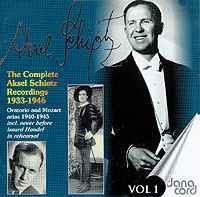Asked to name a Danish tenor, most people will come
up with Lauritz Melchior, which goes to show that itís the whopping
great voices putting across heroic roles in opera houses that reach
Mr. Everyman. Musicians and lovers of the refined art of lieder singing
are likely to add the name of Aksel Schiøtz, and they will know
that in his field he was not a whit inferior to his famous countryman.
Aksel Schiøtz was born in 1906 and gave his
first song recital in 1936. He was taken up by HMV in 1938 but not long
after that the war broke out, leading to the seizure of Denmark by Hitler
in 1940. Staunchly anti-Nazi, Schiøtz, already a national figure,
helped keep alive the stand for freedom at home and in other invaded
Scandinavian countries but his international career was of course on
hold. After the war his work with HMV was resumed, including recordings
of Die schöne Müllerin and Dichterliebe with
Gerald Moore that are legendary. He appeared in the first performances
of Brittenís The Rape of Lucretia, but in 1946 he had to be operated
on for a tumor acusticus and this left half his face lame. By sheer
will-power he managed a comeback of sorts, now singing as a baritone,
and became a widely sought-after teacher in the United States and Canada.
He died in 1975.
In view of the shortness of his career, and taking
into consideration the hiatus caused by the war, it is a wonder that
his recorded legacy is so large. Danacord has lavished its customary
care on a complete edition in 10 volumes of his recordings prior to
the operation, including unpublished material with informative notes
on Schiøtz himself and a number of other Danish and Denmark-based
musicians with whom he worked in particular, plus full texts and translations
of everything sung.
The lieder and Danish song recordings will no doubt
prove to be Schiøtzís greatest contribution, but this first volume
concentrates on oratorio and allows us a glimpse of the singerís not
very extensive work on the operatic stage. In the opening Handel aria
we can immediately appreciate the sheer evenness and beauty of Schiøtzís
voice, his natural musicianship and the clarity of his diction, scarcely
tainted by the trace of an accent (and even this slight trace is undetectable
in the Dowland songs). The conductor Mogens Wöldike was Schiøtzís
mentor and we can hear how he had developed a light-textured, buoyant
baroque style far ahead of his time. The booklet includes Schiøtzís
reminiscences of Wöldike and also his thoughts on singing "Comfort
ye" and "Every valley". He states that "The singers
of Handelís time used embellishments and appoggiaturas lavishly. I doubt,
however, that we should attempt historical correctness in this respect".
I fear, however, that modern ears will find one or two phrases, sung
absolutely as written, just a little too bald, and this is the more
noticeable when the style of singing is not obviously dated in other
respects. In the case of Bach and the very attractive Buxtehude piece,
the German style was more complete in itself than Handelís English style,
requiring less ornamentation, and one can only admire the ease of delivery
and the pure nobility of feeling, without having to make any allowances
for the fact that these are performances from more than 60 years ago.
Also the Dowland emerge remarkably convincingly; our age, which prides
itself on its rediscovery of early music, must reflect that Dowland
and his like were never a closed book for an intelligent musician.
Just two slight reservations need to be expressed.
One is that, though his high notes are mostly free and easy, occasionally
there is a hint of strain. It is known that this became a problem towards
1945 and in retrospect we know it was due to the cancer developing in
his vocal chords. I am not sure exactly when the problem started. The
other is that his generally pure, clean style is sometimes marred by
the minutest trace of a downward portamento.
We also have Schiøtzís memories of Egisto Tango,
an Italian who worked at the Royal Opera in Copenhagen and saw that
the Danes got a staple operatic diet of Mozart and Verdi, but who also
took the trouble to perform Nielsenís "Maskarade" and who
conducted the first recording (with Telmanyi) of that composerís violin
concerto. On the evidence of a few arias we can only say that he seems
to know his job. As a Mozartian tenor Schiøtz was perfectly cast
and these arias are worth studying by todayís singers. The Tchaikovsky
and Gounod are sung in Danish and are thus really curios, but they certainly
show that Schiøtz had operatic potentialities which he would
surely have developed if his career had been allowed to flower in the
1940s and 1950s.
The disc closes with an unpublished rehearsal extract.
Unfortunately both Schiøtz and Wöldike are in uncharacteristically
heavy form with the Stockholm orchestra sounding much larger than the
groups Wöldike conducted at the beginning of the CD (the conductor
admits afterwards that "the rhythm lacks plasticity") so it
may be no great loss that the recordings were not completed.
All who care about good singing should get to know
the work of Aksel Schiøtz. I hope to report on subsequent volumes
in due course. The transfers are good and the voice crosses the decades
with notable realism.
Christopher Howell



